Cushioning the educational fallout of Covid-19 in Bangladesh

The Covid-19 pandemic has disrupted educational activities across Bangladesh, with the closure of educational institutes affecting the regular learning activities of nearly four crore students. Also, the economic slowdown, triggered by the pandemic, is affecting learners as well as their families. Evidence from the Ebola outbreak reveals that protracted closure of educational institutes leads to learning loss, increased dropout and higher inequality. The economic shock deteriorates these damages by suppressing education demand and supply as it adversely affects households, particularly disadvantaged ones. In the long-run, these will impose costs on human capital and welfare.
Pandemic induced shocks to the education sector is adversely affecting those who demand education—students. Access to education resources is particularly a challenge for students in low-income households, with worsening poverty incidence adding to their sufferings. According to various estimates, the poverty rate in Bangladesh is expected to be around 35-40 percent, in contrast to the pre-pandemic rate of around 20 percent. Increased poverty disproportionately affects lower-income households where survival trumps education. This is expected to trigger child labour as families look for income generating opportunities. Some studies indicate that a one percentage point rise in poverty leads to at least a 0.7 percent increase in child labour in certain countries. Also, rise in poverty incidence is likely increase malnutrition, child marriage and other vulnerabilities.
Even before the pandemic set in, Bangladesh was struggling with a high dropout rate across education levels. According to BANBIES data, the dropout rate is highest in secondary education (37.6 percent). Corresponding figures for primary and upper secondary levels are 34.8 percent and 19.6 percent, respectively. Analysts opine that the dropout rates are likely to spike due to the pandemic. In fact, experiences from the Ebola crisis indicate that when schools reopened after the outbreak, girls were 16 percent less likely to be in school.
Shocks also affect the supply side in education. Media reports reveal that some private schools may close as parents fail to pay tuition. Subdued government spending on education is another pressing concern. In fact, we observed that the share of education in the total budget for FY21 is less than that of the revised budget of FY20. So far, there is no definite recovery plan to address the challenges of the education sector.
Adopting online teaching has been suggested for mitigating this ongoing crisis. The government initiative to broadcast lessons through television is praiseworthy. But, it comes with a downside also—creating inequality in terms of access to education. Even inside urban areas, poor households lacking television and internet access are deprived of lessons imparted through distance learning. This problem is even more pronounced in rural areas.
In many instances, there exists a lack of family supervision to monitor and assist in learning activities, which was otherwise partially offset by teachers' classroom supervision in the pre-pandemic period. A recent BRAC Institute of Governance and Development survey on 5,000 students from urban slums and rural areas across Bangladesh indicate that study hours of students have declined by 80 percent due to school closures. The study showed that only 16 percent of students watched educational programmes like "Ghore Boshe Shikhi" and "Amar Ghorey Amar School" on television. Among the students who watch the TV programmes, majority did not find them helpful. Besides, only one percent of students watched educational programmes on the internet.
Data from the Multiple Indicator Cluster Survey (MICS) 2019 shows that nearly 5 percent of households do not own a mobile phone and almost 50 percent do not own a television. Only 5.6 percent of households own a computer and around 37 percent have access to internet at home. Internet access is still a limitation as 53 percent of households have access, while corresponding figures for rural areas are only about 33 percent. There is more to this story, as women and girls tend to have limited access to digital devices due to the power dynamics in family structures, exacerbating the problem even more. A recent report from Bangladesh Telecommunication Regulatory Commission (BTRC) reveals a worrying picture—a whopping 46 lakh mobile connections were discontinued during the pandemic. Although it is difficult to ascertain the exact reasons behind this, it has been anticipated that people tend to cut back on mobile usage during a crisis, prioritising livelihoods instead.
As health and safety are now top priorities, governments across the globe have been confronted to rethink access to education and ensure quality academic activities. Needless to say, the pandemic reality has forced traditional teaching and classroom activities into the backseat. The new reality now requires innovative approaches to address the crisis in the education sector.
Due to the unprecedented nature of the crisis, there is limited evidence on actual impacts of interventions or different approaches to action, coordination, funding or prioritisation in the education sector. However, lessons learned from the Ebola outbreak can help devise recovery and coping strategies.
First, we need to adopt and deliver new learning and evaluation methods. While adoption of online learning methods can only partly address the problem, focus should be given towards promoting inclusive alternative learning methods to build back better on our already ailing education system. As described earlier, Bangladesh is far from embracing full-fledged online learning solutions. A study by Global Partnership on Education found no evidence that online learning, screen or mobile-phone based technologies had played a positive role in supporting at-home learning during Ebola.
The claim that this pandemic is "ed tech's moment" appears to be somewhat misplaced in Bangladesh's context. Rather, in developing country circumstances, the use of radio seems more promising. A UNICEF estimate indicates that more than one million children were reached through radio education during Ebola. Then again, we must not lose sight of the fact that accessibility will be a key concern. In this regard, low-cost yet simple mobile phones with radio options can be a way forward. Mobile phone radio is expected to be the mass media with greatest outreach, quickest start-up and least likelihood of being a vector for Covid-19 transmission. Integrating telecommunication services, radio channels, educational bodies and NGOs into a single platform can constitute a possible policy response in this regard.
Paper-based self-study materials (SSMs) may be considered as an option to facilitate learning. Self-study materials need to be tailored to children who may be at very different levels of attainment. It is important to note that self-study really means that a huge portion of students will not have access to literate family members who can support their study. Paper-based learning materials also come with logistical challenges, which should be carefully dealt with. With regards to conducting exams, creative yet effective evaluation methods can be designed, at least temporarily.
Secondly, we must take an all-out approach with proactive policies to prevent dropout. The Ministry of Primary and Mass Education is collaborating with the UN World Food Programme to distribute high-energy take-home biscuits to nearly three million school children throughout Bangladesh who are missing out on their school meals due to school closures. This programme is spread across 15,200 primary schools across 104 upazilas. Similar interventions should be rolled out to act as incentives for households with school going children. Measures should be also targeted to address the nutrition needs of the children who are not enrolled in school.
Social safety nets should also be ramped up. Existing stipend programmes need to be revamped. New and innovative awareness campaigns should be put in place to reach the general population. Besides education and nutrition, policies should also aim to provide psychosocial support to learners and their families. We are already aware of stigmas triggered by Covid-19. Extending psychosocial support and raising awareness can thus be important ways forward.
Thirdly, we must prepare and enforce appropriate and strict health protocols as per the guidelines of WHO before reopening schools. It is anticipated that we may experience periodic outbreaks. Therefore, adjusting to the "new normal" will require early action and stern containment measures.
We must also focus on training teachers, since educators are also struggling to cope with new teaching methods. Ensuring teacher's training is likely to be less of a challenge, as teachers tend to own mobile device even in low-income settings. Evidence from Kenya and Rwanda suggests that smartphones and SD cards loaded with videos of teaching practices are used to support coaching and training. In the recent past, Bangladesh has also been cited as a success case in imparting teacher's training through mobile phones implemented via the English in Action project. Therefore, remote teacher training might be feasible and impactful to facilitate learning activities now and in days to come.
There is a need to ensure the judicious spending of funds as well. The government must exploit every possible opportunity to chip in the funds required for the recovery and continuity of this sector. As funds from development partners have started flowing in, judicious and accountable spending of the money can help navigate through the pandemic. While capacity and resource constraints will inevitably prioritise sectoral action, funding can be channeled towards new rapid responses, or empower existing interventions to adapt to evolving predicaments.
Finally, the government should aim at generating good data and evidence, as these are considered to be sound long-term investments. For recovery and building back better on education, a sound evidence base will help devise informed policy inputs. Early action in this regard will help government agencies to initiate evidence-based educational responses to address the challenges caused by the Covid-19 pandemic and for future possible outbreaks as well.
Dr M Abu Eusuf, Professor, Department of Development Studies and Director, Centre on Budget and Policy, University of Dhaka & Executive Director, Research and Policy Integration for Development (RAPID). Email: [email protected].
Md Rabiul Islam Rabi, Research Economist, Research and Policy Integration for Development (RAPID). Email: [email protected]

 For all latest news, follow The Daily Star's Google News channel.
For all latest news, follow The Daily Star's Google News channel. 



Comments